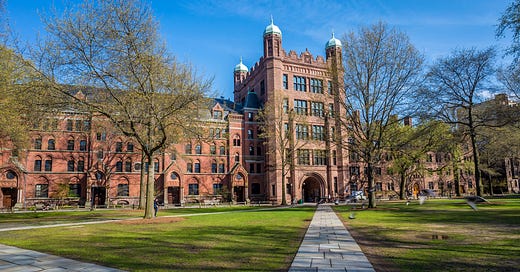E-Pluribus | March 17, 2022
Yet another Ivy League attack on free speech, the return of blacklisting, and public school teachers' speech is under fire from both sides.
A round up of the latest and best writing and musings on the rise of illiberalism in the public discourse:
Aaron Sibarium: Hundreds of Yale Law Students Disrupt Bipartisan Free Speech Event
Another day, another Ivy League assault on free speech. This time, Yale grabs the unenviable spotlight. Earlier this month, a panel discussion involving both a progressive and a conservative group went off the rails thanks to student protesters who targeted the Alliance Defending Freedom and members of the Federalist Society, as Aaron Sibarium of the Washington Free Beacon reports.
The March 10 panel, which was hosted by the Yale Federalist Society, featured Monica Miller of the progressive American Humanist Association and Kristen Waggoner of the Alliance Defending Freedom (ADF), a conservative nonprofit that promotes religious liberty. Both groups had taken the same side in a 2021 Supreme Court case involving legal remedies for First Amendment violations. The purpose of the panel, a member of the Federalist Society said, was to illustrate that a liberal atheist and a conservative Christian could find common ground on free speech issues.
"It was pretty much the most innocuous thing you could talk about," he added.
That didn’t stop nearly 120 student protesters from crowding into the event.
When a professor at the law school, Kate Stith, began to introduce Waggoner, the protesters, who outnumbered the audience members, rose in unison, holding signs that attacked ADF. The nonprofit has argued—and won—several Supreme Court cases establishing religious exemptions from civil rights laws, most famously Masterpiece Cakeshop v. Colorado Civil Rights Commission in 2018.
As they stood up, the protesters began to antagonize members of the Federalist Society, forcing Stith to pause her remarks. One protester told a member of the conservative group she would "literally fight you, bitch," according to audio and video obtained by the Washington Free Beacon.
Read it all.
Heather Mac Donald: Denounce Putin, or Be Blacklisted
Earlier this week, we included Robert Tracinski’s essay, Should We Be Canceling Russia? in our daily roundup (item #1). The Manhattan Institute’s Heather MacDonald addresses the same issue at City Journal. While Tracinski’s essay focused on appropriate accountability for those complicit in Putin’s actions in Ukraine while being careful not to cast the net too wide, Mac Donald emphasizes the danger of demanding explicit denunciations to avoid ending up on a blacklist, a clear violation of the principles of free expression and conscience.
Classical music’s recent self-abasement for its “whiteness” laid the groundwork for this presumptive group guilt. Since the George Floyd race riots in May and June 2020, directors of orchestras, opera companies, and conservatories have lambasted their own field for its historical demographics, said to be inextricably linked to racism. Music critics have sneered at Beethoven and other composers for having allegedly leveraged their whiteness to achieve undeserved acclaim. Mea culpas and promises of fealty to Black Lives Matter have become de rigeuer in mission statements and fundraising pitches. Now these coerced confessions are demanded of a subset of musicians whose Russianness makes them as suspect as whiteness does the entire Caucasian population. Even Russian music itself faces a political litmus test.
The most recent casualty of the compelled-speech norm is 20-year-old pianist Alexander Malofeev. He is the latest in a long line of Russian keyboard masters, including Sviatoslav Richter, Emil Gilels, Lazar Berman, Vladimir Ashkenazy, Evgeny Kissin, Sergei Rachmaninoff, Anton Rubinstein, and many more. The cherubic-faced Malofeev has no known ties to Putin and has not defended Putin or the Ukrainian invasion. Nevertheless, the Vancouver Recital Society cancelled his contract for an August 2022 recital. Artistic director Leila Getz explained in a written statement that she could not “in good conscience present a concert by any Russian artist at this moment in time unless they are prepared to speak out publicly against this war.”
In a subsequent interview, Getz claimed to have been looking out for Malofeev’s well-being. “The first things that came to my mind were, why would I want to bring a 20-year-old Russian pianist to Vancouver and have him faced with protests and people misbehaving inside the concert hall and hooting and screaming and hollering?” she said. Such professions of paternalism have become standard among cancellers. Malofeev could have decided for himself whether he wanted to risk protest.
Read it all here.
David French: Pronouns, Pluralism, and the Problem of Free Speech in Public Schools
While pundits and politicians debate and argue both sides of “woke” education issues, students clearly become caught in the middle. However, David French at The Dispatch urges his newsletter readers to consider the teachers as well.
For the last several months, “anti-woke” activists and legislators have been pushing bills through red state legislatures that attempt to limit classroom instruction (and sometimes even discussion) of so-called “divisive concepts.” Advocates often refer to the bills as “anti-CRT” legislation, while critics call them “gag orders.”
As I’ve written at length, the bills (with precious few exceptions) are incredibly broad, prohibiting speech the First Amendment plainly protects. As applied to public colleges and universities, they’re blatantly unconstitutional. They’re likely legal in public schools only because of the draconian limits courts have placed on teachers’ in-class constitutional rights.
The Ricard case is different. Here the “anti-woke” seek judicial relief from the “woke.” The plaintiff, Pamela Ricard, is a middle school teacher who refuses to use preferred pronouns or to use names that indicate a child has adopted a new gender identity. According to her complaint, the school suspended her under a general policy that prohibited “harassment” or “bullying” of students and has now adopted an explicit policy requiring teachers to use a student’s chosen name and a student’s preferred pronouns.
Think for a moment about the imposition on teacher speech. The question of whether a person’s gender identity can completely override their biological sex is one of the most contentious and debated issues in American culture today. Pronouns and names represent declarations and descriptions. Calling a person “she” is a declaration that the person you’re referring to is, in fact, a woman or girl.
[ . . . ]
I have the exact same objection to this policy that I do to anti-CRT laws. What, exactly, are we teaching our children here? Are we preparing them to be citizens of a “pluralistic, often contentious society,” or are we teaching them that “offensive” speech should trigger formal, legal complaints? If you think for one second that students educated with that view will suddenly embrace the marketplace of ideas when they enter college, you’re sadly mistaken.
Read the whole thing.
Legends of Dissent: Frederick Douglass, Part 4
Here’s the fourth installment in our new graphic vignette feature, Legends of Dissent: Frederick Douglass at the Tremont. As always, we welcome your feedback.
Around Twitter
Via Tim Urban, Disney’s Aladdin disclaimer, and Mike Nayna’s take on what it’s about:




Isaac Newton wasn’t talking about cultural and social issues when he said “for every action there is an equal and opposite reaction,” but it doesn’t mean the principle can’t rear its head. The Massachusetts Institute of Technology appears to be interfering with student speech by prohibiting them from even requesting that someone else wear a mask:




And finally, via Noam Blum, if you are struggling with how to insult someone who doesn’t hold your exact position on anti-wokeness, this chart’s for you:











